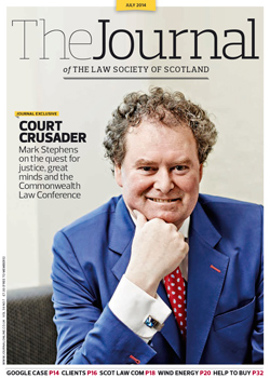Fit to grant?

Mark Shepherd of the Professional Practice team breaks down the guidance on assessing the capacity of clients proposing to grant 2000 Act powers of attorney to highlight how the view formed by the solicitor is reflected in the advice on further consultation
Over the past few years, the Professional Practice department has become increasingly involved in answering enquiries on the preparation of continuing and welfare powers of attorney and assessment of capacity of the granter.
Guidance is available on the Society’s website under Rules and Guidance, Section F, Division H: Guidance on Continuing and Welfare Powers of Attorney (“PoA Guidance”), and related to rule B1.5, Guidance on Vulnerable Clients.
The position can be quite complex and is of importance not only to solicitors determining whether a potential granter has capacity, but also to members of the medical profession who are frequently called on by solicitors to give a medical assessment as to capacity, and to sign the certificate that forms an essential part of the power of attorney document. Here are some points to consider:
(A) The starting point is the Adults with Incapacity (Scotland) Act 2000, which at subs (3)(c) of both ss 15 and 16 requires as one of the conditions of validity of a continuing or welfare power of attorney, that it shall incorporate a certificate in the prescribed form by a practising solicitor or “a member of another prescribed class” that: “(i) he has interviewed the granter immediately before the granter subscribed the document; “(ii) he is satisfied, either because of his own knowledge of the granter or because he has consulted other persons (whom he names in the certificate) who have knowledge of the granter, that at the time the continuing power of attorney is granted the granter understands its nature and extent; “(iii) he has no reason to believe that the granter is acting under undue influence or that any other factor vitiates the granting of the power”.
(B) Next, reference should be made to the PoA Guidance, para 9, which states that solicitors acting as certifiers “should consult as to capacity and name the person whom they have consulted, in accordance with the relevant provisions of statute and of the prescribed form of certificate, unless confident from their own knowledge of the granter that the granter has relevant capacity”.
(C) There is no definition or explanation of “from their own knowledge”, but it appears that it cannot be as a result of a single meeting with the granter. Obviously, it could result from having acted for or having had meetings with the granter, over a period of time prior to the assessment of capacity, but how many meetings would be sufficient: four, or three, or even just two? This is the difficulty that solicitors are under, as the assessment of capacity is not an exact science, each case being considered on its own circumstances.
(D) It is of course the case that in all transactions, not just the grant of powers of attorney, solicitors must consider whether the client has the capacity to instruct them. However, that is normally done by discussing the matter at hand with the client and noting the client’s responses, taking into account that there is a general presumption in favour of capacity. The 2000 Act, ss 15 and 16 seems to require something more than that, however, when dealing with powers of attorney.
Who to consult?
(E) The PoA Guidance quoted states that where the solicitor does not have “knowledge of the granter” (discussed at (C) above), the solicitor “should consult as to capacity and name the person whom they have consulted”. Therefore the next question is, “Who do they consult?”
(F) A guidance publication of the Office of the Public Guardian includes the following answer to the question whether a solicitor can sign a prescribed certificate on the basis of having consulted the attorney(s) rather than an individual not involved in the process:
“Although this would not prevent registration with the Office of the Public Guardian, it is not best practice to sign from such consultation alone as this could be open to challenge in the future as a conflict of interest on behalf of the attorney. In terms of property matters, we are aware that the Keeper of the Registers of Scotland will exclude his indemnity from a purchaser’s title in terms of section 12(2) of the Land Registration (Scotland) Act 1979 where the seller acts under such a continuing power of attorney. To avoid an exclusion of indemnity the Keeper will require evidence that the attorney has not acted ‘auctor in rem suam’ (in his own interests) by acting as consultee at part B of the prescribed certificate to the continuing power of attorney.”
The suggestion here is that a solicitor may consult the proposed attorney, but this is stated as being open to challenge. Indeed, para 9 of the PoA Guidance states that “it is not good practice to consult a proposed attorney for purposes of certification”.
(G) If not the proposed attorney, who should the solicitor consult? The PoA Guidance, para 9 provides: “Where the solicitor as certifier has significant cause for doubt as to capacity, it is recommended that paragraph 9 of the Vulnerable Clients Guidance be followed, and that guidance would normally be sought from a medical practitioner or clinical psychologist”.
What if there is not such a “significant cause for doubt”?
(H) The Vulnerable Clients Guidance at para 8 states: “A solicitor may, and in some circumstances should, seek and carefully consider expert guidance. However, the solicitor retains responsibility for compliance with all relevant Rules and should not abdicate responsibility to the expert.”
And at para 9: “In cases of doubt as to the extent to which, and circumstances in which, capacity can be exercised, or conversely as to the extent to which incapacity prevents a contemplated act or transaction, the advice of a medical practitioner or clinical psychologist should be sought. It may be necessary to approach someone with particular specialist expertise. The solicitor should not seek a generalised and simplistic verdict of ‘capable’ or ‘incapable’. The solicitor should explain the act or transaction contemplated and the legal requirements for it to be valid. The solicitor should explain any indications of relevant capacity or incapacity of which the solicitor is aware, and any steps which the solicitor proposes in order to facilitate exercise of capacity.”
The wording here is not at odds with the wording at para 9 of the PoA Guidance, because the latter proceeds on the basis that incapacity has not yet been identified whereas the Vulnerable Clients Guidance proceeds from the point where there is doubt regarding capacity, and/or an element of vulnerability which could point towards incapacity.
(I) It follows that if a solicitor is (i) not confident from his/her own knowledge of the granter that the granter has relevant capacity, and (ii) has significant cause for doubt as to capacity, then the solicitor should normally seek guidance from a medical practitioner or clinical psychologist.
(J) It also follows that if a solicitor is (i) not confident from his/her own knowledge of the granter that the granter has relevant capacity, but (ii) does not have significant cause for doubt as to capacity, then the solicitor should consult some other person. The PoA Guidance states: “Where the solicitor as certifier has formed a clear view as to capacity or incapacity, and seeks corroboration of that view, it may be appropriate to seek the views of another professional, such as a nurse or social worker” or, “exceptionally, the views of a lay person”. Presumably that lay person might be a relative or friend of the granter, or the manager or carer at a care home etc.
Solicitor’s responsibility
(K) The bottom line (as set out at (H) above) is that “the solicitor retains responsibility for compliance with all relevant rules”. In certain cases (and perhaps with a long-term “risk aversion” perspective), some solicitors are taking the view that they are not able (or not prepared) to certify a power of attorney without the “authority” of a medical assessment of capacity. Alternatively, they are seeking the completion of the medical certificate to be by the medical practitioner.
(L) In response to an enquiry from a medical practice, the Society has pointed out that it can issue guidance on this matter, but cannot either prohibit solicitors in power of attorney situations from seeking medical assessments, or compel them (nor would it be right to do so) to sign certificates in powers of attorney if they are not satisfied regarding capacity of the granter. Each case should be judged on its own circumstances by each individual solicitor dealing with it, taking account of the Society’s guidance as described.
(M) In the situation of a solicitor writing direct to a medical practice asking for a medical opinion as to whether the proposed granter of a power of attorney would have the capacity to understand the nature and effect of such a document, it is to be assumed that the opinion sought is actually an opinion on whether the proposed granter is able to understand the nature and effect of a legal document, the terms of which would be explained by the solicitor to the granter. However, the solicitor would still need to be satisfied when going over the terms of the document with the proposed granter that the proposed granter understood the nature and effect of the document.
In this issue
- “The Union and the law” revisited
- Cartels: raising the stakes
- The cooling-off catch
- Attack vectors into the law: smartphones
- Money laundering: the Fourth way
- Has Glasgow morality come to Edinburgh?
- Reading for pleasure
- Opinion: Graeme McCormick
- Book reviews
- Profile
- President's column
- 10-year target
- Headline act
- Forget that you ever knew me
- The cooling-off catch (1)
- Tax devolution: the legal implications
- Ninth life
- Planning: how does the wind blow?
- Going off the rails
- Employee shares? Sort them yourself
- Angostura, anyone?
- National priorities
- Scottish Solicitors' Discipline Tribunal
- People on the move
- Heart of the action
- Helping solicitors on Help to Buy
- Conditions countdown
- Where bullocks fear to roam
- Fit to grant?
- Controlling the risks
- Ask Ash
- Opening up the law
- From the Brussels office
- Law reform roundup
- Post-corroboration Review update






